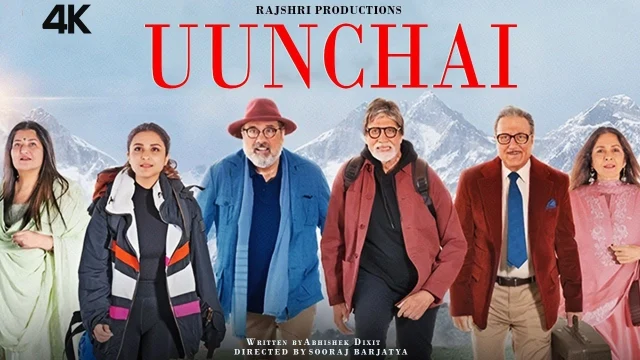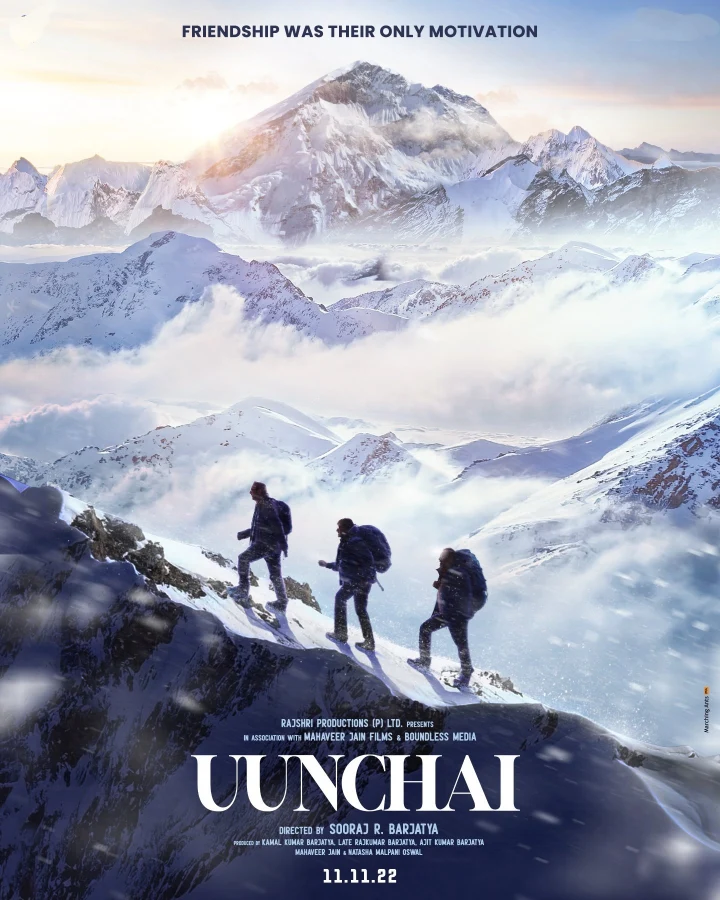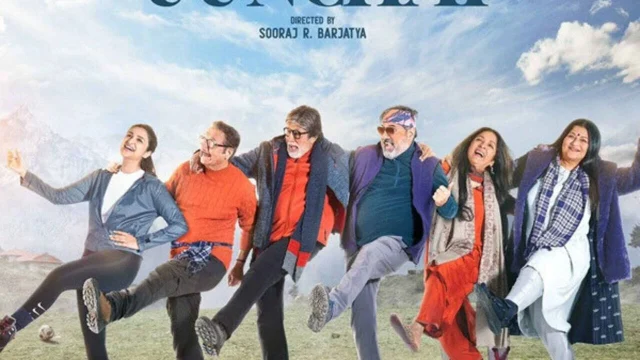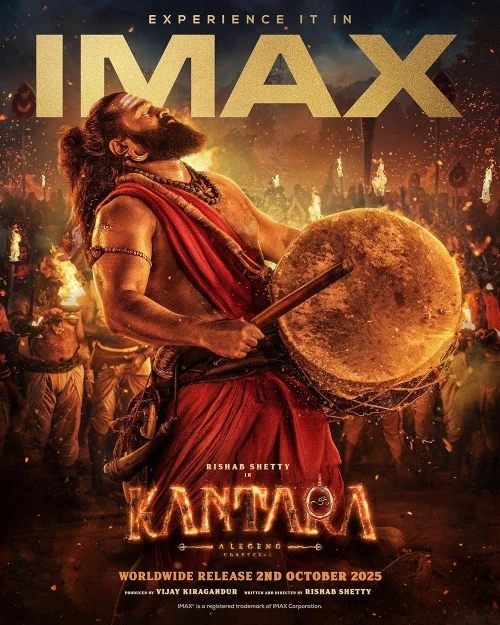
Uunchai Movie Review: A Soulful Journey of Friendship, Courage, and Altitude Introduction to Uunchai Movie
Uunchai is an emotional story that beautifully captures lifelong friendships and the challenges of aging. The plot starts when three elderly friends choose to honor their late companion’s final wish—to trek to Everest Base Camp and spread his ashes. What unfolds is a deeply personal and physically demanding journey, filled with laughter, loss, reflection, and discovery. Their adventure becomes both a tribute and a spiritual transformation for each character, showing the strength of human resolve.
The narrative of Uunchai movie doesn’t rely on traditional drama. Instead, it explores the raw emotions that come with grief and the fear of growing old. Watching older adults undertake a Himalayan journey may seem unusual in film, but here, it becomes a symbol of emotional endurance. The decision to cast experienced actors adds depth to the film. Their backgrounds come through, making every scene feel real and grounded.
What makes this movie special is its mature storytelling. It doesn’t focus on glamour or quick pacing but thrives in quiet moments—when characters share silence, exchange knowing glances, or remember the past. Through its poignant storytelling and beautiful visuals, the film gently encourages viewers to rethink what courage really means. Often, it’s not about heroism or loud actions; it’s about choosing to move forward, despite fear and limits.
Star Cast and Their Characters
The film features an exceptional group of veteran actors who deliver heartfelt performances. Amitabh Bachchan plays Amit Shrivastava, the thoughtful and quiet member of the group. His character reveals a subtle strength over time, showing emotional resilience. Anupam Kher plays Om Sharma, a man dedicated to discipline, who often argues but is deeply loyal to his friends. Boman Irani as Javed Siddiqui adds warmth and humor, acting as the emotional glue of the group.
Neena Gupta gives a charming performance as Javed’s supportive yet spirited wife, while Sarika plays Mala, a character marked by emotional distance and past secrets. Parineeti Chopra appears in a refreshing role as the young trek leader Shraddha, balancing compassion and discipline with confidence. Each character contributes something unique, representing various emotional and generational layers within the story.
The chemistry among the cast is impressive. Their interactions feel genuine, as if they have shared a lifetime of friendship outside of the screen. This authenticity enhances the film’s emotional impact. The casting of Uunchai movie choices were perfect, not just for star power, but because each actor brings emotional depth to their role. Their performances embody the soul of the narrative.
The Uunchai Movie Storyline & Plot Overview
The story begins with the sudden death of Bhupen, the fourth and most adventurous member of a close-knit group of elderly friends. Devastated by his loss, the remaining trio decides to fulfill Bhupen’s lifelong dream—a trek to Everest Base Camp. Despite health issues and family objections, they choose to honor his memory with an act of bravery. Their journey across various terrains becomes not just physical but deeply emotional.
Along the way, they encounter altitude sickness, strained relationships, secrets, and unresolved grief. Yet, each challenge draws them closer to acceptance and change. The trek becomes a setting for inner growth, especially as suppressed feelings rise to the surface. They discover more about themselves and each other than they ever anticipated. Old grudges are settled, buried memories come to light, and new connections form in extreme situations.
The plot of Uunchai movie avoids flashy twists. Instead, it unfolds gradually through rich character development and meaningful interactions. While the premise might seem simple, the story resonates because of its sincerity and depth of emotion. It’s about finding strength in tough times and understanding that age is no barrier to pursuing dreams or healing past wounds.
Direction and Visual Grandeur in Uunchai Movie
Sooraj Barjatya surprises audiences with a clear shift from his typical filmmaking style. Known for family dramas set in domestic settings, he ventures into the adventure genre with sensitivity. His direction in this film emphasizes emotional depth over dramatic spectacle. Every frame invites reflection, and each scene flows naturally into the next without unnecessary theatrics.
The Himalayas serve as more than just a backdrop. They represent both challenge and spiritual clarity. Barjatya employs wide-angle shots and close-ups to contrast the vast mountains with the characters’ personal journeys. The intentional slow pacing allows viewers to absorb both the visuals and the inner struggles of the characters. The physical climb mirrors the emotional healing process beautifully.
There’s an elegance in how the film is framed. The silence of the snow-covered peaks, the rugged paths, and even the quiet moments between conversations become storytelling tools. The direction captures more than scenery—it captures states of mind. Barjatya shows that growth is possible for any filmmaker, and this film brings visual richness to profoundly human themes: friendship, loss, and renewal.
Music, Background Score & Emotions
The film’s music is subtle and moving, perfectly matching the emotional journey of the characters. The soundtrack doesn’t overwhelm the story but supports it, adding depth to key moments without being intrusive. Songs like “Keti Ko” and “Arre Oh Uncle” express the theme of embracing life, regardless of age. The music acts as an invisible companion to the characters’ internal and external experiences.
The background score of Uunchai movie is minimal yet impactful. Soft piano keys or traditional strings swell gently at emotional peaks, emphasizing reflection over action. It’s clear the composer understood the director’s vision—less is more. The score allows emotional moments to breathe, elevating them without force. It offers one of the most delicate musical treatments in recent cinema.
The emotional tone of the movie is beautifully held together through sound. Each musical cue is purposefully placed, enhancing scenes of Uunchai movie without overwhelming them. This careful approach ensures the focus stays on performances and the story while subtly guiding the audience through each emotional moment. The result is a cohesive, immersive experience that resonates long after the credits roll.
Dialogues and Screenplay in Uunchai Movie
The dialogues in the film are carefully crafted, reflecting the wisdom and vulnerability of characters in their later years. Conversations feel natural, avoiding melodrama, and often include humor or quiet emotion. There are moments when a single line speaks volumes, capturing years of friendship or decades of regret. This economy in dialogue adds to the film’s emotional depth.
The screenplay follows a steady pace. It doesn’t rush to its climax but creates space for characters to grow. Each part of the journey—whether a hotel stop, a health scare, or a silent sunrise—adds to the emotional development. The transitions between scenes are smooth, maintaining an even tone throughout while ensuring character arcs remain central.
What stands out is the authenticity. Whether it’s the light banter between old friends or a serious heart-to-heart, the script keeps it believable. It avoids over-explaining and trusts the audience’s emotional intelligence. The result is a screenplay that honors the complexity of aging, friendship, and grief—making it one of the most sincere scripts in recent Bollywood storytelling.

7 Cinematography & Shooting Locations
The cinematography in the film is breathtaking. Manoj Kumar Khatoi’s lens captures the vast, snowy Himalayan landscapes with incredible detail and emotional depth. From the busy streets of Delhi to the peaceful mountain trails, each frame carries emotional weight. The visuals are not just beautiful; they tell stories, evoke memories, and deepen the characters’ inner experiences. The transition from city chaos to mountain calm mirrors the characters’ shift from emotional clutter to personal clarity.
Much of the film was shot on location in Nepal, and the authenticity is present in every frame. Natural lighting plays in Uunchai movie a big role in creating the film’s realistic atmosphere. Early morning fog, golden sunsets, and icy winds are not just filmed; they are experienced. Khatoi makes sure each visual moment enhances the emotional flow of the story. The high-altitude scenes do not glamorize the terrain but reveal its rough, honest beauty.
Alongside the outdoor scenes, indoor settings like cozy guesthouses and makeshift tents are framed with closeness. Close-ups capture expressions, aging lines, and silent emotions effectively. The balance between grand views and personal moments makes the cinematography one of the film’s strongest storytelling tools. It takes the audience to both a physical and emotional height that enriches the story.
Themes of Friendship & Aging
At its core, the film explores friendship and the process of growing old. The story challenges stereotypes about aging. It shows that emotional strength and a desire for growth can remain strong over time. These characters are not retired from life; they are rediscovering it. Their friendship, developed over decades, forms the backbone of the film. The laughs, disagreements, and shared understanding among them make their bond relatable.
The journey also addresses the isolation that often comes with aging. Many older people feel invisible, but this film emphasizes their importance and strength. It shows that emotional expression is not limited by age. Vulnerability, grief, joy, and adventure all find a place in their lives. The group’s willingness to embark on a risky trek symbolizes a reclaiming of vitality, independence, and dignity.
There is also a strong message about acceptance—of limitations, regrets, and unresolved issues. By leaning on one another and moving forward, the characters show a friendship that is not only loyal but transformative. This portrayal of aging with courage and community offers a fresh, inspiring view that is rarely seen in mainstream cinema.
Performances: Who Stood Out?
Amitabh Bachchan brings quiet strength to his character. He communicates with subtlety, delivering one of his most understated performances in recent years. There is a particular gravity in his portrayal that commands empathy. Anupam Kher is more expressive, shifting between stubbornness and warmth. His character arc is meaningful and complex, allowing him to display emotional intensity.
Boman Irani adds much-needed lightness to the film. His charm and humor make heavy moments more palatable. He brings heart to the group, acting as a peacemaker and emotional anchor. Neena Gupta shines in a supporting role that could have felt one-dimensional but instead adds depth and warmth. Her chemistry with Boman feels genuine and delightful.
Sarika and Parineeti Chopra also shine in their limited yet impactful roles. Sarika conveys depth with few words, while Parineeti holds her own as a modern, authoritative figure who also shows vulnerability. Together, the ensemble does not compete; they complement one another. The balanced performances enhance the film, ensuring every character leaves a mark.
Sooraj Barjatya’s Comeback
This film marks a significant comeback for Sooraj Barjatya, known for his sweet family dramas. With this project, he reinvents himself while still holding on to the values he cherishes. Gone are the extravagant weddings and melodramatic family disputes; instead, we get thoughtful storytelling, subtle conflict, and raw human emotion. His choice to focus on older protagonists is bold and admirable in today’s youth-oriented cinema.
Barjatya’s storytelling has grown. He does not provide clear morals; he lets viewers find meaning through character experiences. There is less preaching and more observation. The journey, both physical and emotional, unfolds at a pace that allows for reflection. He respects the audience’s intelligence and emotional capacity. This approach makes the film not just heartfelt but also intellectually rewarding.
With this movie, Barjatya shows that growth as a filmmaker can happen at any stage of one’s career. He preserves the essence of his signature warmth and emotional insight while moving into more grounded, reflective territory. It is a comeback that symbolizes reinvention, showing he can evolve with time and audience expectations.
Symbolism and Hidden Meanings
Symbolism is intricately woven into the narrative. The climb to the Everest Base Camp represents more than just a physical journey—it symbolizes a path through grief, aging, and healing. The mountain becomes a metaphor for internal struggles. Every milestone reached parallels an emotional barrier being overcome. This physical challenge mirrors their emotional fatigue, making their success feel even more significant.
The ashes of their deceased friend symbolize the weight of memory and the strength of legacy. By carrying them to the summit, the characters metaphorically carry unresolved emotions, guilt, and love. When they finally release the ashes, it is not just about letting go; it is about acceptance. The snow, silence, and thin air also carry deep meaning, reflecting purity, solitude, and the fragility of life.
Even minor elements like shared meals, music during the trek, or a sudden illness convey layered meanings. They highlight the significance of companionship, nostalgia, and mortality. The symbolic depth of the film enriches the story without overwhelming it. This balance makes the narrative feel both simple and profound—a rare achievement.
Final Verdict: Why Watch Uunchai
This film is not a typical commercial entertainer. It is an emotional journey that resonates with anyone who has loved, lost, or sought something greater. It offers a refreshing narrative that challenges age stereotypes and emphasizes meaningful relationships. You won’t find high-octane action or romance, but you will find emotional honesty wrapped in beautiful visuals and sincere performances.
Watching this film feels like sitting down with old friends and revisiting past memories. It is comforting yet challenging, gentle yet profound. The characters linger with you long after the credits roll—not because they are perfect, but because they are real. Their fears, hopes, and dreams resonate across generations.
If you appreciate storytelling that connects with the soul, this film deserves your attention. It serves as a reminder that it is never too late to start over, forgive, or feel alive. More than just a movie, it gently reminds us of what truly matters in life—love, friendship, and the courage to keep moving forward.

visit now our other review ⚠️🚨⚠️ Mili Movie :Review Cast, Story, Highlights, and Box Office Analysis


